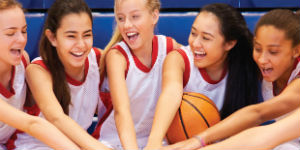School
4 min Read
How to make the most of tournament weekends

September 28, 2015
School
4 min Read

September 28, 2015


It’s time to hit the road: your tween’s team is competing in an out-of-town sports tournament, dance competition, or swim meet this weekend. Your young athlete is likely revved up about the chance to travel with friends, stay in a hotel and have access to “treat” food. But as a parent travelling with the group, how do you balance your child’s opportunity for unbridled fun with the fact that there is a big game or performance involved?
Usually, your child’s coach will provide the schedule and overall expectations for the weekend. However, not all coaches have the same approach when it comes to athletes’ routines and preparation for “away” matches or performances.
“In order for our players and teams to compete well in a number of games over a short period of time, they need proper rest and are asked to make healthy food choices,” says Dave MacNeil, President of Wildhawk Basketball in Waterloo, Ont. “As coaches, we try to emphasize that our players’ decisions have an impact not only on themselves, but also on the performance of the entire team. We believe that the sooner these positive life choices can be introduced, the sooner they become habit.”
Kendra Burton, Director of Swimming Development with the Guelph Marlin Aquatic Club, says that long-term growth comes from giving young athletes some ownership and letting them experience the natural consequences of their mistakes. “Learning from failure is one of the most effective ways to make strides towards independence and creating good habits,” she says. “Athletes who stay up too late or eat poorly prior to a competition will experience low energy, a sore stomach, and a disappointing performance at their event. If the athlete doesn’t learn these lessons early, future mistakes may happen in situations with higher stakes.”
Your role as a team parent is to support the coach’s philosophy, but also to follow your instincts when it comes to your budding athlete. You know his triggers and tendencies better than anyone. Watch for signs that he is getting too wound up or worn out, and act swiftly. You can also do a bit of proactive planning based on your child’s individual needs, especially on the first or second tournament. If he’s a sensitive sleeper, for example, bring his pillow from home. If she’s a picky eater, pack a bag of snacks that you know she’ll like.
If screen time is a potential distraction, discuss the parameters ahead of time. For example, devices can be used freely during travel time, but not at the competition site. Look at the weekend schedule together to identify possible blocks of free time that may be suited for socializing, sightseeing or splashing with teammates in the hotel pool. If Saturday is the main competition day, agree on a reasonable bedtime for Friday night, with the idea that they can celebrate with friends when things have wrapped up on Sunday. Now that’s a win-win.
Veteran sports parents suggest these tips to promote healthy eating while away:
“As an alternative to a team meal at a fast-food restaurant, we share the cost of renting a conference room in the hotel and bring in fresh, healthy food from a grocery store. If an extra room isn’t available, we use the hotel room ironing boards to create a makeshift buffet table.” – Karen Kueneman, soccer parent
“We look for ways to give the kids a healthy breakfast, similar to what they would have at home. We also take full advantage of the hotel’s ice machine. Filling the water bottles with ice and having cold water readily available makes it easier for the kids to choose water as their main beverage.” – Karen Taraschuk, hockey parent
“Some venues allow you to bring in outside food, so parents will join forces to provide veggie trays, fruit, granola bars, and so on. Other times, though, we’re limited to the less-nutritious food at the canteen, so we do the best we can with our other meals.” – Lyndsay Woodard, dance parent
Originally published in ParentsCanada magazine, October 2015.